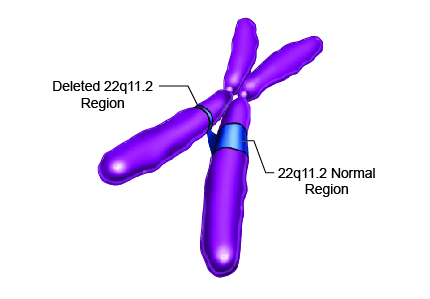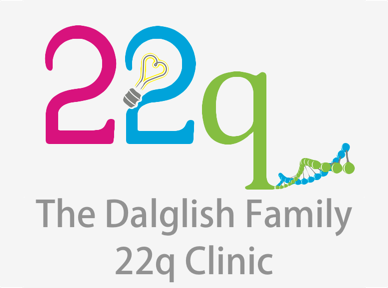What is 22q? Genetics Questions & Answers
Disclaimer: The following information pages are provided for educational purposes only. They are not intended to be taken as medical advice. If you have questions or concerns, please discuss them with your doctor or healthcare provider.
What are Chromosomes?
- Chromosomes are bundles of our DNA.
- DNA is made up of genes which determine all of our individual traits (for example: hair colour, height, eye colour).
Where do we get our chromosomes from?
- Half of our chromosomes come from Mom and half come from Dad.
- All of our cells have 23 pairs of chromosomes. They are numbered from 1 to 22. The 23rd pair determines whether we are male or female.
What does 22q11.2DS (22q) mean?
- 22q11.2DS is pronounced “twenty-two Q, one, one, point two deletion syndrome”
- Just like how we describe the location of a house by using its street name and number, 22q11.2 indicates a location within our DNA: chromosome 22, section 11.2
- People with 22q11.2DS are missing a small section of DNA from the 22nd chromosome. This small section is “deleted”.
- For most people this genetic change is not inherited from their parents. The deletion occurs randomly for no known reason.
- If you have 22q11.2DS and give birth to a child, your chance of passing on this deletion is 50% for each pregnancy. It is recommended that anyone who has 22q11.2DS receive genetic counselling when thinking about starting a family.
Who is more likely to have 22q11.2DS?
- Both boys and girls have the same chance of inheriting this deletion. It occurs in about 1 in every 2148 newborns.
- 22q11.2DS is found world-wide. It is found in every culture and in every ethnic group. No one ethnicity has more people with 22q11.2DSthan another.
- When a child is born with 22q11.2DS, it is no one’s fault. It is just a random genetic occurrence.
What does it mean to be “missing a small piece of DNA”?
- Every cell in the human body is missing a small piece of genetic material, As a result, various health problems may occur.
- Every person is unique from one another. Some people with 22q11.2DS may have few features while others may have many.
- This variation in 22q11.2DS features can even occur when a parent passes the deletion to his/her child. In other words, the features of a parent with 22q11.2DS may be very different from those of his/her affected child.

Can doctors repair my DNA so I don’t have the deletion anymore?
- Unfortunately, no. However there are many ways to manage your needs.
- The Dalglish Clinic recommends that patients:
- Have genetic and medical tests as indicated
- Receive interdisciplinary medical care from a variety of specialists based on individual needs
